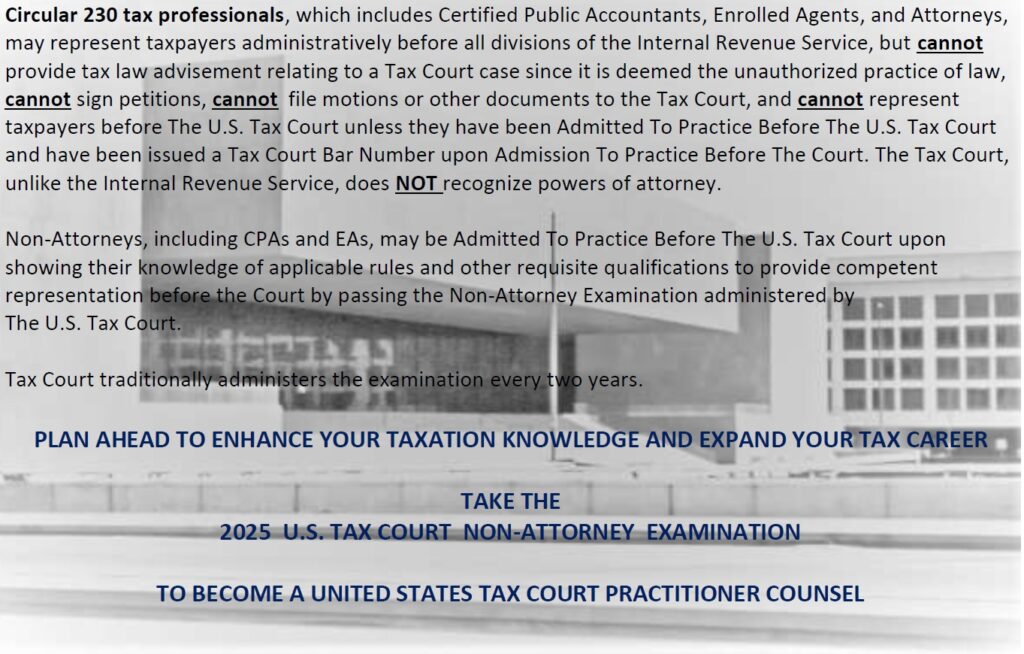What is a United States Tax Court Practitioner aka USTCP?
The United States Tax Court is a Court of record established by Congress under Article I of the U.S. Constitution.
When the Commissioner of the Internal Revenue has determined a tax deficiency, the taxpayer may dispute the deficiency in Tax Court before paying the disputed amount.
The United States Tax Court is a Court of limited jurisdiction.
Tax Court’s jurisdiction includes the authority to redetermine a deficiency, increase or decrease a deficiency, redetermine transferee liability, make certain types of declaratory judgments, adjust partnership items, review of failure to abate interest and issue orders for abatement of interest, determine awards of administrative and litigation costs, redetermine worker classification and redetermination of employment taxes, determine relief from joint and several liability on a joint return, review collection actions subject to collection due process determinations, review awards to whistleblowers, review of passports certification actions and failure to reverse certification actions, review after bankruptcy and receivership actions are among some of the Court’s jurisdictional authorities
Taxpayers may be represented before the Court by an attorney or another person who has been Admitted To Practice Before The United States Tax Court. A Non-Attorney may be Admitted To Practice Before the Court upon satisfying the requirements specified in the Tax Court Rules of Practice and Procedure Title XX, Rules 200, 201 and 202 governing Practice Before the Court.
These specialized tax professionals are referred to as United States Tax Court Practitioner counsels.
The U.S. Tax Court Non-Attorney written examination is administered by Tax Court every two years for admission to practice before Tax Court.
Click here to redirect to the US Tax Court Web Site
Non-Attorney Admission To Practice Before the Court
and Examination Procedures Information Document
Top 4 Reasons to Become a United States Tax Court Practitioner:
- Enhance your taxation knowledge and expertise to provide the highest quality taxpayer representation services in the industry.
- Expand your firm’s tax controversy representation services to include taxpayer litigation before the United States Tax Court taking your firm’s representation services to the next level and significantly increasing your firm’s revenue.
- Career advancement. USTCP’s are in high demand across the country. Their proven knowledge and expertise is substantially rewarded.
- Insatiable desire to understand tax law and how it applies to various taxation circumstances.
How to Qualify!
The purpose of the Non-Attorney Written Examination is to test the ability of applicants to competently provide taxpayer advisement regarding Tax Court litigation, appropriately manage required case related procedures and filings to the Court both pre-trial and post-trial, and provide competent representation of taxpayers during trial litigation before the Tax Court.
A Non-Attorney applicant must satisfy the Court, by means of a written examination given by the Court, that the applicant possesses the requisite knowledge and qualifications to provide competent representation before the Court. Tax Court Rule 200(a)(3)
Eligible Non-Attorney Applicants for Admission to Practice Before the United States Tax Court must file with the Admissions Clerk of the United States Tax Court, a completed application accompanied by the specified non-refundable application fee determined by the Court, successfully pass the written examination, meet certain other requirements of the Court including being independently sponsored by two counsels whom are admitted to the U.S. Tax Court Bar.
When is the Tax Court Exam?
The U.S. Tax Court administers the Non-Attorney written examination every two years.
The 2025 written examination will be conducted by the United States Tax Court in the fall of 2025.
The determination to administer the 2025 examination in person in Washington, DC or remotely is at the sole discretion of the Tax Court.
The date, time, and location method of the fall 2025 examination will be released by the Court approximately 6 months before the scheduled exam date.
Tax Court will specify a period of time for eligible examination candidates to apply to the Clerk of the United States Tax Court to take the fall 2025 examination. A separate non-refundable application fee is assessed by the Court. Currently, the fee is $150.00.
Upon approval of the Court, the applicant will be provided with additional information necessary for the examination procedure.
Examination candidates are fully responsible for any separate costs of travel to Washington, DC to take the written examination, if applicable, or costs of registration with a remote examination provider.
What is Tested on the Written Tax Court Exam?
The examination consists of the following four parts designed to test the applicant’s knowledge of these subject areas:
- U.S. Tax Court Rules of Practice and Procedure
- Federal Taxation; Substantive Tax Law
- Federal Rules of Evidence
- Legal Ethics; American Bar Association Model Rules of Professional Conduct.
Four hours is allowed to answer the examination questions in writing.
To pass the Tax Court Exam, the applicant must demonstrate proficiency in each subject area by achieving a score of 70% or greater on each of the four parts of the examination.

